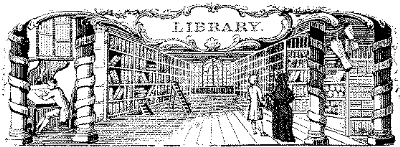
One of the greatest of my "discoveries" was the library. We had a lot of books at home, but nothing approaching the seemingly huge collections of even the smallest libraries in our area. The miniscule library in our grade school had plenty of books that I found of interest. The fact that I was so young was probably the main reason I found the school collection adequate, because once I got to high school, our library at that institution appeared far too small to meet even my basic research needs.
In spite of our small schools, we were not lacking for good libraries. The Lemont Public Library was a tiny step up from those of the schools. It was housed in a back section of the Police Station and was the first library I encountered that had that old musty, dry "wooden" smell. The sun would filter in through the high windows, illuminating the dust on the plain wood floors, the sturdy shelves, the stacks of books and, naturally, the stirred up particles swirling in the air.
Going a little farther afield, and with the assistance of my mother's chauffeuring, I had the Joliet Public Library at my disposal. This was the first truly large collection I encountered and it was better than the proverbial candy store. Housed in an old, massive stone building, this library had a wealth of periodicals, reference books, and far more volumes in the public stacks than I'd ever imagined possible. While I read fiction for fun, I devoured the science publications that I needed for my various school research projects.

The next level of book collections was discovered when the Burr Oak System went into effect. This was a public service in which anybody who lived in Cook County was eligible for a Chicago Public Library card. I could then go to the main library in Chicago and check out music scores and recordings to just about any piece, something that was beyond any of my previous resources. The Chicago edifice, with its marble floors and intricate mosaics, was also the most gorgeous library building I'd ever seen. I never bothered with the science sections of that library because I had a better source: the Field Museum library. Just as old, warm, and comfortable as any other library, this collection was a bit different. The books were housed in various locations all over the museum and patrons simply requested them after getting the information from the card catalogue. The librarians did the legwork, and all I had to do was sit at a table and do my research. It was about as close to being royalty as I'd ever felt.
Once I went to college, the libraries just got better. I worked in the enormous Music Library of the University of Illinois, while my sister worked in the Biology Library. The former was spacious and modern, but the latter was older, with that familiar mustiness about it. Surprisingly, the old Bio Library was the first place I discovered "chatting" on the computers. Back in the early 1980s, there was no internet, but the university had an internal system, with terminals at most libraries. Late at night, after perusing the science tomes, I could relax by striking up a conversation (or two or three) with students at other libraries. The computers seemed to fit right in with the traditional books, shelves and tables. Little did we suspect how things would advance in the next 20 years.
With the development of the internet, research capabilities are now expanding exponentially. Any little question can be pursued without even leaving our house. It is commonplace to find out what REAL books are available before going to the libraries, so time spent at the actual institutions is more efficiently utilized. Here in Austin, our public library system is okay, but it is nothing compared to the collections at the University of Texas. I've only recently discovered that I could get a free courtesy borrower card for UT through our Austin library. For the first few months, I used the Fine Arts Library for checking out music on a regular basis. I assumed that most of the other books in which I'd be interested were housed in the large and modern Perry Castaneda Library. A bit more searching and I discovered the Life Sciences Library. Now I can use actual copies of the reference works that are cited so frequently on the internet sites but not readily available except in specialized collections. But the best part about this "new" library is that it is OLD. The stacks are crowded, musty and, somehow, familiar. I might do my preliminary research on our computer at home, but the experience of going to that wonderful library is almost an end in itself.